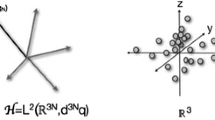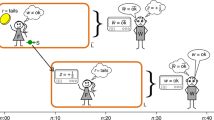How does the world come to be just what it is, and not something else? Classical physics offers only a partial answer. It says that the deterministic laws of nature fix everything over all of spacetime in terms of things at a single instant of time. But the remaining question is then: What fixes things at this single instant of time? What determines the initial conditions?
Access this chapter
Tax calculation will be finalised at checkout
Purchases are for personal use only
Preview
Unable to display preview. Download preview PDF.
Similar content being viewed by others
References
N. Bohr, Atomic Theory and the Description of Nature(Cambridge University Press, Cambridge, 1934), p. 1.
Ref. 1, p. 1.
3 Ref. 1, p. 18.
N. Bohr, Atomic Physics and Human Knowledge(Wiley, NewYork, 1958), p. 90.
N. Bohr, Essays 1958/1962 on Atomic Physics and Human Knowledge(Wiley, New York, 1963), p. 60.
H. P. Stapp, The Copenhagen Interpretation, Am. J. Phys. 40, 1098 (1972) and chap. 3 of the present book.
H. Everett III, Rev. Mod. Phys. 29, 463 (1957).
D. Bohm, Phys. Rev. 85, 166, 180 (1952).
J. S. Bell, On the Einstein–Podolsky–Rosen Paradox, Physics 1, 195 (1964).
H. P. Stapp, Significance of an Experiment of the Greenberger–Horne–Zeilenger Kind, scheduled for publication in Phys. Rev. A(February 1993).
H. P. Stapp, AQuantum Theory of the Mind–Brain Interface, Lawrence Berkeley Laboratory Report LBL-28574 Expanded, University of California, Berkeley, 1991, and chap. 5 of the present book.
Author information
Authors and Affiliations
Editor information
Editors and Affiliations
Rights and permissions
Copyright information
© 2009 Springer-Verlag Berlin Heidelberg
About this chapter
Cite this chapter
Stapp, H.P. (2009). Choice and Meaning in the Quantum Universe. In: Stapp, H.P. (eds) Mind, Matter and Quantum Mechanics. The Frontiers Collection. Springer, Berlin, Heidelberg. https://doi.org/10.1007/978-3-540-89654-8_7
Download citation
DOI: https://doi.org/10.1007/978-3-540-89654-8_7
Publisher Name: Springer, Berlin, Heidelberg
Print ISBN: 978-3-540-89653-1
Online ISBN: 978-3-540-89654-8
eBook Packages: Physics and AstronomyPhysics and Astronomy (R0)




